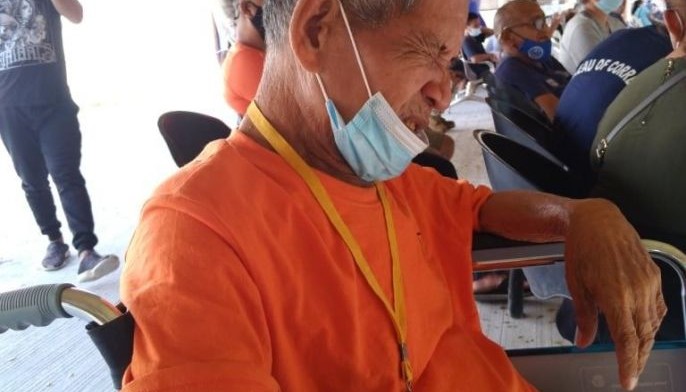MANILA, Philippines — Kapatid, a group representing the families of political prisoners in the Philippines, urged the national government to release persons deprived of liberty whose health might be at risk amid the coronavirus pandemic.
This comes after the group confirmed the recent passing death of Jesus Alegre, a 75-year-old political prisoner from Negros Occidental who was critically ill at the New Bilibid Prison in Muntinlupa.
Related Stories
"How many more have to die before our government takes action?" Fides Lim, Kapatid spokesperson, said.
In a statement, the group offered condolences to the farmer's bereaved family as it called for a full investigation into Alegre's death.
Alegre was brought back to the NBP hospital on Saturday morning, the group said in an earlier statement, after being in and out of the hospital inside NBP and in Muntinlupa due to chronic obstructive pulmonary disease and diabetes mellitus.
The group said his condition made him more at risk of coronavirus transmission given the conditions in prison. His name, Kapatid said, was submitted to the Department of Justice four times in the past year, but no response was given.
"Silence means inaction, and inaction can be tragic," Lim said.
READ: Group urges release of critically ill political prisoner
On June 11, Alegre reportedly showed increased signs of weakness and disorientation. He had diarrhea, swollen lower limbs, vomited his food, and could no longer sit or stand up without support or go to the toilet.
It was only around 7 in the morning of June 13 that Alegre was brought to the public hospital of Muntinlupa where he expired around 10:30 a.m.
It is still unclear if he was tested for COVID-19, Kapatid said in its statement.
"What kind of government jails a family for 16 years and ignores all appeals for their freedom [even when] the elderly Alegre couple are eligible for pardon and humanitarian release especially at this time of pandemic?” said Lim.
Kapatid also urged the release of his wife Moreta, now 74, who is detained at the Correctional Institute for Women in Mandaluyong.
Alegre's son Selman, 47, also remains at the New Bilibid Prison Maximum Security Compound.
Two other political prisoners—Joseph Canlas, 59, and Maximo Redota, 68—also recently passed away within three days in just the month of May.
“Alegre is the fifth political prisoner to die in 32 days...His death shows up the terrible state of the highly congested prisons in the country, making the call to release prisoners whose lives are at risk from COVID-19 most exigent,” Lim said.
Alegre, a poor farmer from Barangay Taba-Ao in Sagay town, was arrested on April 14, 2005. According to Kapatid, he was in jail for 16 years "after being convicted for a trumped-up murder charge to drive him away from the small plot of land he tilled."
The group continues to reiterate its calls for the Supreme Court to institutionalize a writ of kalayaan to decongest jails amid the coronavirus pandemic.
Some two to three prisoners die in detention each day on average, Kapatid said citing figures from the Department of Justice which supervises Bureau of Corrections jails.
“A full investigation into Alegre’s death is needed to ascertain the responsibility and accountability of government agencies in looking after the health and safety of persons deprived of liberty,” said Lim.
"We press Chief Justice Gesmundo’s exigent intervention as well as DOJ action, especially to decongest jails and to order an inspection of all prison facilities, including infirmaries and quarantine centers inside prisons. We reiterate our call for the promulgation of the writ of kalayaan to protect the right to life and health of those in government custody, including the political prisoners who suffer the worst abuse of deliberate neglect."
— with reports from Kristine Joy Patag


